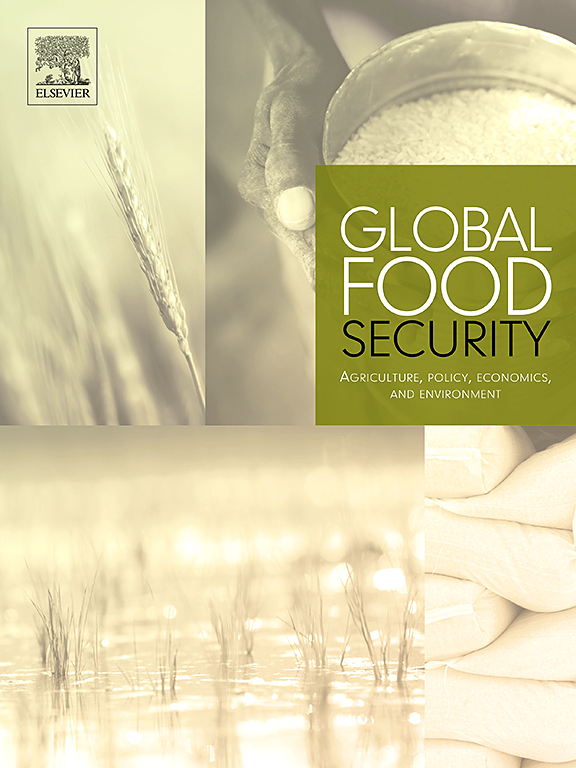Armed conflict and gendered participation in agrifood systems: Survey evidence from 29 African countries
IF 9.6
1区 经济学
Q1 FOOD SCIENCE & TECHNOLOGY
Global Food Security-Agriculture Policy Economics and Environment
Pub Date : 2024-12-12
DOI:10.1016/j.gfs.2024.100821
引用次数: 0
Abstract
This paper provides empirical micro-level evidence on the gendered impacts of armed conflict on economic activity in agriculture and other sectors, combining large-N sex-disaggregated survey data with temporally and spatially disaggregated conflict event data from 29 African countries. We find that local conflict exposure is only weakly related to labour-force participation, but strongly reduces the total number of hours worked and increases engagement in the agricultural sector. These net impacts exist for both men and women. However, the reduction in hours worked is significantly greater among men, while the increase in agricultural activity is significantly greater among women. In the longer term, impacts of conflict on employment two years later are stronger when no more conflict ensues than if further conflict occurs, challenging the widespread idea of one-off conflict shocks fading away over time and suggesting that labour markets adapt to and absorb lasting conflict situations. Different types of conflict event have qualitatively similar impacts, which are strongest for explosions, such as from air strikes or landmines. Overall, our findings underline that armed conflict entails structural economic, social and institutional change, which creates complex, gendered impacts on economic activity.
农业粮食系统中的武装冲突和性别参与:来自29个非洲国家的调查证据
本文结合来自29个非洲国家的按性别分列的大n调查数据和按时间和空间分列的冲突事件数据,为武装冲突对农业和其他部门经济活动的性别影响提供了微观层面的实证证据。我们发现,当地冲突暴露与劳动力参与的关系很弱,但却大大减少了总工作时间,增加了农业部门的参与度。这些净影响对男性和女性都存在。但是,男性工作时数减少的幅度要大得多,而女性农业活动增加的幅度要大得多。从长期来看,两年后冲突不再发生时,冲突对就业的影响比发生进一步冲突时更大,这挑战了一次性冲突冲击随着时间的推移而消失的普遍观点,并表明劳动力市场适应和吸收持久的冲突局势。不同类型的冲突事件在性质上具有相似的影响,其中爆炸(如空袭或地雷)的影响最大。总体而言,我们的研究结果强调,武装冲突导致结构性经济、社会和制度变革,从而对经济活动产生复杂的性别影响。
本文章由计算机程序翻译,如有差异,请以英文原文为准。
求助全文
约1分钟内获得全文
求助全文
来源期刊

Global Food Security-Agriculture Policy Economics and Environment
FOOD SCIENCE & TECHNOLOGY-
CiteScore
20.90
自引率
3.40%
发文量
69
期刊介绍:
Global Food Security plays a vital role in addressing food security challenges from local to global levels. To secure food systems, it emphasizes multifaceted actions considering technological, biophysical, institutional, economic, social, and political factors. The goal is to foster food systems that meet nutritional needs, preserve the environment, support livelihoods, tackle climate change, and diminish inequalities. This journal serves as a platform for researchers, policymakers, and practitioners to access and engage with recent, diverse research and perspectives on achieving sustainable food security globally. It aspires to be an internationally recognized resource presenting cutting-edge insights in an accessible manner to a broad audience.
 求助内容:
求助内容: 应助结果提醒方式:
应助结果提醒方式:


